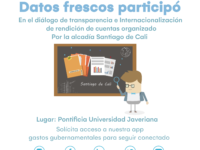Case Study
Innovative use of social media for co-creation of the 4th National Action Plan (2018-2020) –…
Innovative use of social media (Whatsapp) platform to increase participation and disseminate information for the creation of Paraguay's 4th National Action Open-Government Plan. These 14 online groups were created to allow citizens from the countryside, from marginalized and vulnerable groups, to be able to participate on an equal standing with other citizens from urban areas with access to policyholders. It is innovative because it was the first time we used this platform to involve citizens.




